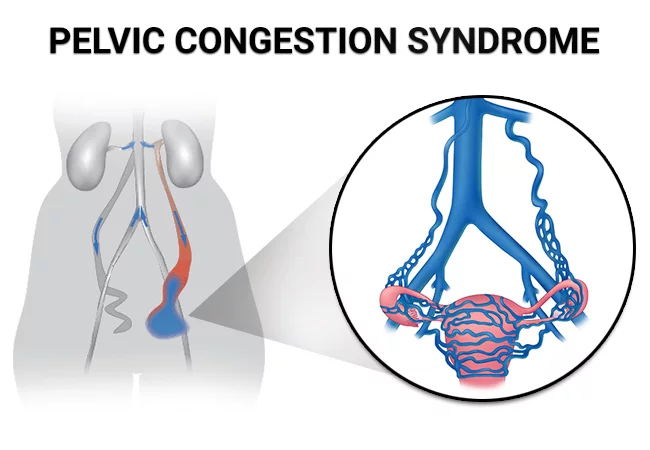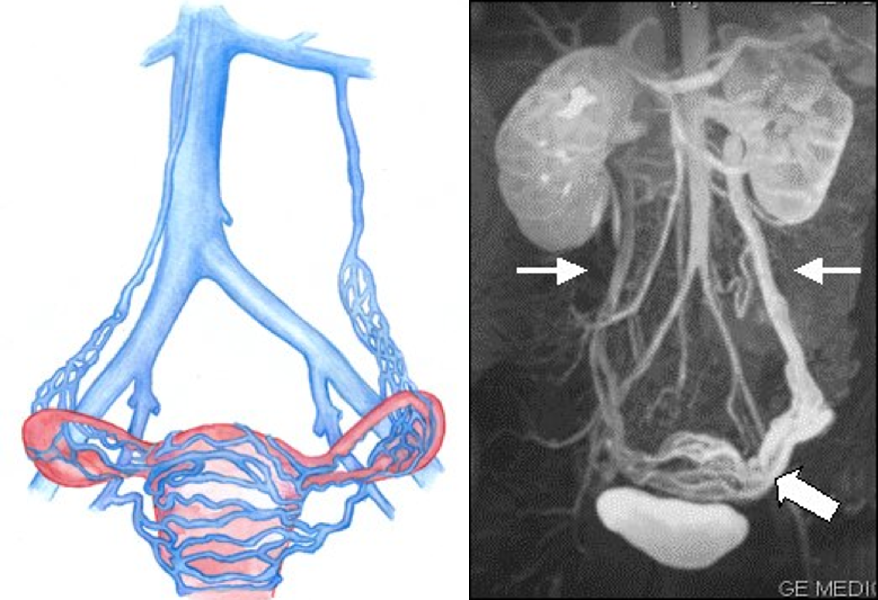Back
Pelvic Congestion Syndrome (PCS)
By Shannon Strauch, PTA, STMT-1 on 5/17/2024

Pelvic congestion syndrome (PCS) is a condition characterized by chronic pelvic pain, often caused by varicose veins in the pelvic region. These veins can become enlarged and engorged, leading to discomfort and pain, especially when standing or sitting for long periods. Pelvic floor therapy can play a significant role in managing and alleviating the symptoms of PCS.

How Pelvic Floor Therapy Can Help with Pelvic Congestion Syndrome
Improving Blood Flow and Lymphatic Drainage
: Pelvic floor exercises not only enhance circulation in the pelvic region but also promote lymphatic drainage. Strengthening and relaxing the pelvic floor muscles help improve the movement of lymph, reducing fluid retention and congestion in the pelvic area.Muscle Strengthening and Relaxation
: A key component of pelvic floor therapy is training the muscles to both contract and relax effectively. Proper muscle function can alleviate some of the pressure on the pelvic veins and lymphatic vessels, reducing symptoms of congestion and swelling.Pain Management
: Techniques used in pelvic floor therapy, such as manual therapy, biofeedback, and electrical stimulation, can help manage and reduce pelvic pain. These methods can decrease muscle tension and improve overall pelvic health, which includes better lymphatic function.Postural Correction
: Proper posture can influence pelvic health and lymphatic drainage. Pelvic floor therapy often includes postural training, which can alleviate pressure on the pelvic veins and lymphatic vessels, improving overall pelvic function and reducing congestion.Education and Behavioral Modifications
: Pelvic floor therapists educate patients on lifestyle modifications that can help manage symptoms. This includes advice on avoiding prolonged standing or sitting, dietary changes, and exercises to improve overall pelvic and lymphatic health.Breathing Techniques
: Proper diaphragmatic breathing can improve abdominal and pelvic pressure dynamics, helping to reduce symptoms of PCS. Coordinating breathing with pelvic floor muscle movements can enhance lymphatic flow.
Specific Techniques in Pelvic Floor Therapy for PCS and Lymphatic Health
Kegel Exercises
: Designed to strengthen the pelvic floor muscles, which support lymphatic and blood flow. A pelvic floor therapist can guide patients on the correct technique and ensure they are performed properly.
Myofascial Release
: This manual therapy technique helps release tightness and tension in the pelvic muscles and connective tissue, improving blood flow and lymphatic drainage.
Trigger Point Therapy
: Identifying and releasing trigger points in the pelvic muscles can alleviate pain, improve muscle function, and enhance lymphatic flow.
Pelvic Floor Relaxation Exercises
: Learning to relax the pelvic floor muscles can be as important as strengthening them. Therapists teach relaxation techniques to help reduce muscle tension and improve blood and lymphatic circulation.
Lymphatic Drainage Techniques
: Gentle, rhythmic massage techniques that stimulate the flow of lymphatic fluid. These techniques can be incorporated into pelvic floor therapy to reduce swelling and improve lymphatic function.
Benefits of Pelvic Floor Therapy for PCS and Lymphatic Health
Reduced pelvic pain and discomfort
Improved pelvic muscle function
Enhanced blood and lymphatic circulation in the pelvic region
Better management of symptoms, leading to improved quality of life
Reduced swelling and fluid retention
Conclusion
Pelvic floor therapy offers a comprehensive approach to managing pelvic congestion syndrome. By addressing muscle function, posture, and lifestyle factors, this therapy can help alleviate the chronic pain and discomfort associated with PCS. If you suspect you have PCS or are experiencing chronic pelvic pain, consulting a pelvic floor therapist can be a valuable step towards finding relief. Reach out to us at Pelvic Health Center in Madison, NJ to set up an evaluation and treatment! Feel free to call us at 908-443-9880 or email us at receptionmadison@pelvichealthnj.com.
Read More:
How Chronic Pelvic Congestion in Men Contributes to Prostatitis By Shannon Strauch, PTA, STMT-1 on 12/11/2024 How lymphatic issues can cause symptoms of prostatitis Prostatitis and Tight Pelvic Floor Muscles: A Comprehensive Guide By Shannon Strauch, PTA, STMT-1 on 12/10/2024 How a tight pelvic floor can be the reason for prostatitis symptoms
Are you ready to live pain free?
Request An Appointment